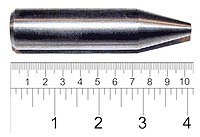
Photo from wikipedia
OBJECTIVE To examine the patterns of cause-specific mortality and relationship between internal exposure to uranium and specific causes in a pooled cohort of 29,303 workers employed at three former uranium… Click to show full abstract
OBJECTIVE To examine the patterns of cause-specific mortality and relationship between internal exposure to uranium and specific causes in a pooled cohort of 29,303 workers employed at three former uranium enrichment facilities in the United States with follow-up through 2011. METHODS Cause-specific standardized mortality ratios (SMRs) for the full cohort were calculated with the U.S. population as referent. Internal comparison of the dose-response relation between selected outcomes and estimated organ doses was evaluated using regression models. RESULTS External comparison with the U.S. population showed significantly lower SMRs in most diseases in the pooled cohort. Internal comparison showed positive associations of absorbed organ doses with multiple myeloma, and to a lesser degree with kidney cancer. CONCLUSION In general, these gaseous diffusion plant workers had significantly lower SMRs than the U.S. POPULATION The internal comparison however, showed associations between internal organ doses and diseases associated with uranium exposure in previous studies. Am. J. Ind. Med. 60:96-108, 2017. Published 2016. This article is a U.S. Government work and is in the public domain in the USA.
Journal Title: American Journal of Industrial Medicine
Year Published: 2017
Link to full text (if available)
Share on Social Media: Sign Up to like & get
recommendations!